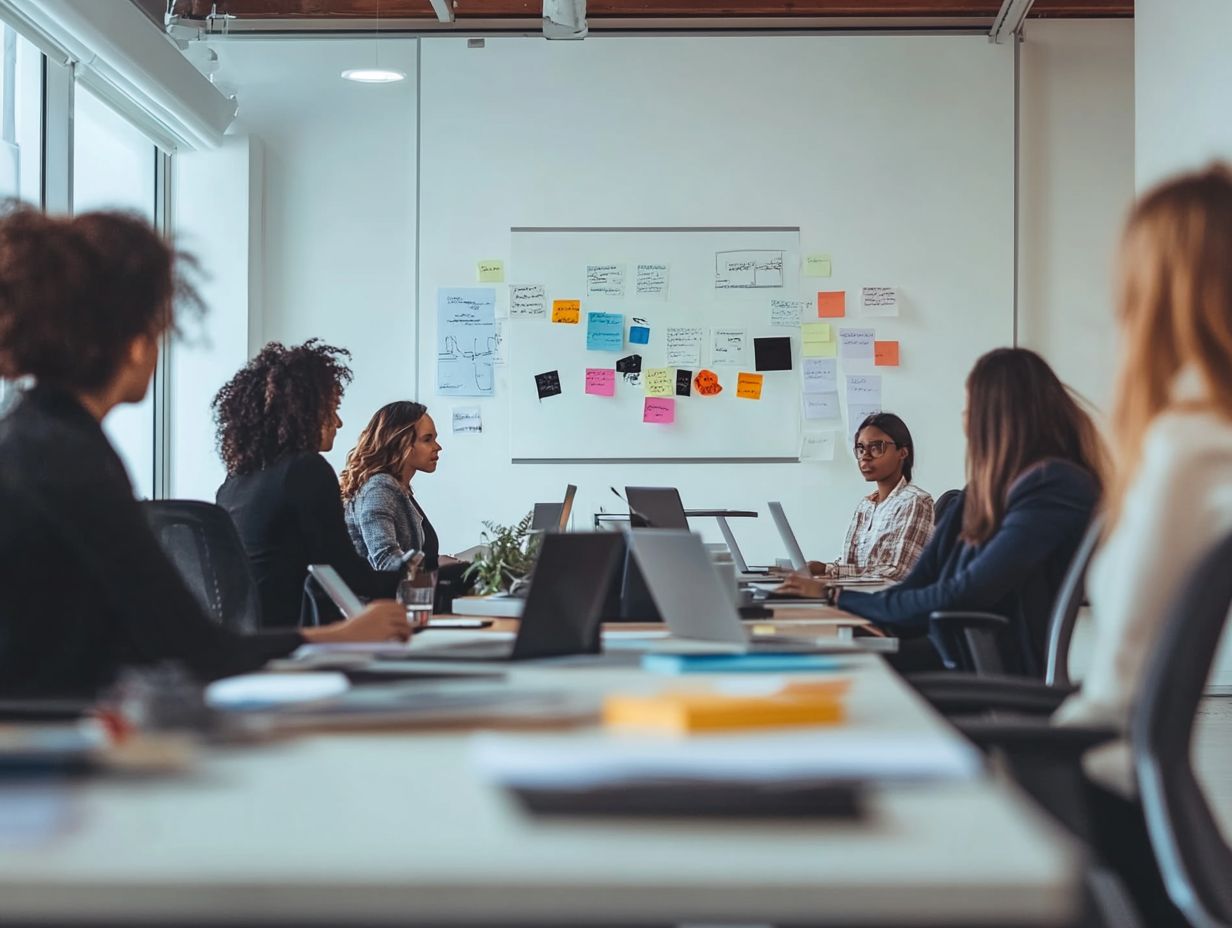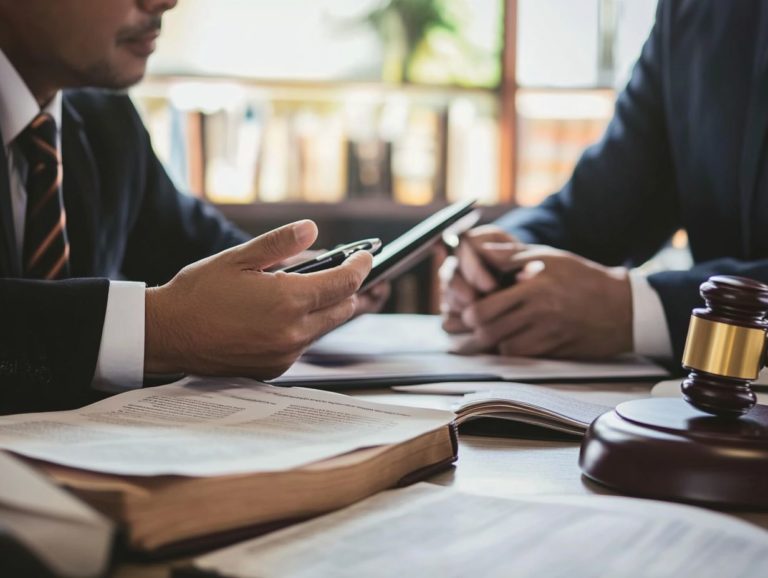What Constitutes IP Misuse?
Intellectual Property (IP) is an important asset for both individuals and businesses. It encompasses creations such as inventions, designs, and artistic works.
Understanding how to define and protect these rights is essential in today s digital landscape. The unauthorized use of IP such as trademark, copyright, and patent infringements poses significant threats that you should be aware of.
This article explores various types of IP misuse, highlighting common examples like counterfeiting and piracy. We will also discuss the consequences of such actions and best practices for prevention.
Take action now to protect your creative assets!
Contents
Key Takeaways:

IP misuse refers to the unauthorized use of intellectual property, such as trademarks, copyrights, and patents.
Watch out for IP misuse like counterfeiting, piracy, and plagiarism, as these can lead to legal trouble and financial loss.
To prevent IP misuse, individuals and businesses should implement best practices for protecting their intellectual property, such as registering trademarks and copyrights and monitoring for infringement.
Understanding Intellectual Property (IP)
Understanding Intellectual Property (IP) is crucial for both individual creators and corporations. It helps protect your unique creations, such as designs, trade secrets, and other innovative outputs.
In the United States, the legal framework surrounding IP is shaped by a mix of international agreements and local laws. This framework is primarily enforced by organizations like the World Intellectual Property Organization and domestic legal experts, such as The West Law Firm in Texas, led by Scott West in Sugar Land.
Grasping the nuances of IP rights can significantly impact your competitive edge. Neglecting to safeguard these rights may expose you to theft and costly commercial litigation.
Defining and Protecting IP
Defining and protecting your intellectual property (IP) requires a clear understanding of the legal protections available for your creative endeavors. This includes patents, copyrights, and trademarks, each ensuring you have exclusive rights to your creations.
These protections are invaluable as they prevent unauthorized use, reproduction, or exploitation of your works and inventions. Proper legal safeguards incentivize innovation and protect you against ownership disputes, allowing you to monetize your ideas without the fear of infringement.
As you navigate the complexities of IP law, understanding the importance of cease and desist orders is essential. These serve as formal requests to stop unauthorized actions. If you face infringement, you have various legal remedies available, including monetary damages and injunctions, providing crucial recourse to defend your rights and interests.
Types of IP Misuse
Types of IP misuse encompass various unlawful activities that infringe upon the rights of IP holders. These violations can lead to significant financial and reputational harm.
Common forms of IP misuse include trademark infringement, copyright infringement, and patent theft, each presenting distinct challenges.
Addressing these offenses effectively requires tailored legal remedies designed to safeguard your interests and uphold the integrity of your intellectual property.
Trademark Infringement
Trademark infringement occurs when an unauthorized party uses a trademark that is either identical or confusingly similar to a registered trademark. This can mislead consumers and damage the brand’s reputation.
This illegal use confuses customers and undermines efforts to cultivate trust and loyalty in the market. Legal experts emphasize that assessing trademark infringement depends on factors such as the strength of the original mark, the similarity between the marks, and the channels of trade.
Landmark cases like Polaroid Corp. v. Polarad Electronics Corp. and Harley-Davidson, Inc. v. Grottanelli set precedents for how courts navigate these disputes. They highlight the nuances involved in trademark law.
The importance of registering trademarks cannot be overstated. Registration grants legal protections that empower trademark holders to assert their rights effectively.
When dealing with cases of infringement, experts recommend documenting all instances of unauthorized use. Seeking legal counsel is crucial to explore potential resolutions, whether through negotiation or litigation. After all, the outcomes can significantly impact a brand’s market position and financial viability.
Copyright Infringement
Copyright infringement refers to the unauthorized use, reproduction, or distribution of copyrighted material, including literature, music, and software. This violates the legal protections established under the U.S. Copyright Act.
This type of illegal use can have serious consequences for creative output and innovation. It stifles artistic expression and diminishes the financial incentives that motivate creators to deliver original work.
Fortunately, legal frameworks exist to protect creators. These frameworks allow them to enforce their rights and seek remedies against violators. Landmark cases like Burrow-Giles Lithographic Co. v. Sarony and Sony Corp. of America v. Universal City Studios, Inc. clarify the fine line between protection and innovation.
These decisions influence consumer protection laws and highlight the importance of respecting intellectual property. This respect nurtures a thriving creative landscape.
Patent Infringement
Patent infringement, often called patent theft, occurs when a business makes, uses, sells, or offers to sell a patented invention without the patent holder’s permission. This infringes upon their exclusive rights as outlined under 18 U.S.C.
This violation can lead to significant legal consequences, including hefty monetary damages and injunctions that prevent further illegal use.
Courts can reward patent holders for lost profits and, in certain situations, impose punitive damages to discourage future violations.
The notorious legal clash between Apple and Samsung illustrates how patent disputes can escalate. These disputes influence innovation and competition within the tech industry.
Such conflicts often delay product releases and raise costs for consumers. Ultimately, they stifle progress and impede new advancements across various sectors.
Common Examples of IP Misuse

Common examples of IP misuse, such as counterfeiting, piracy, and plagiarism, significantly undermine the rights of creators. They compromise the integrity of intellectual property across diverse sectors.
Counterfeiting
Counterfeiting is the unauthorized imitation of products that aims to mislead consumers by presenting fake goods as genuine. This practice poses significant challenges to intellectual property rights and corporate accountability.
The ripple effects of this illicit activity extend beyond companies facing financial losses. They also impact consumers who may unknowingly purchase inferior or even harmful goods.
Industries such as luxury fashion, electronics, and pharmaceuticals are particularly susceptible. Counterfeit versions can infiltrate the market, undermining brand reputation and consumer trust.
Legal responses vary across jurisdictions, with stricter enforcement measures and heightened penalties emerging in response to these growing concerns. International agreements, like the Agreement on Trade-Related Aspects of Intellectual Property Rights (TRIPS), foster collaboration among nations to combat counterfeiting.
This ensures that both businesses and consumers are better protected against these deceptive practices. If you suspect IP misuse, consult a legal expert to understand your rights and options.
Piracy
Piracy is a growing concern in the digital world. It involves the unauthorized reproduction or distribution of copyrighted materials and poses a significant threat to consumer protection and the rights of creators.
This issue manifests in various forms. Software piracy involves individuals illegally copying or distributing software applications. Media piracy encompasses music, movies, and television shows.
These activities erode financial returns for creators and put consumers at risk of malware and other security threats linked to unverified downloads.
You can address these challenges with legal remedies like copyright lawsuits and takedown notices, designed to safeguard intellectual property rights.
It’s essential to cultivate an understanding of the implications of piracy. When consumers are informed, they can make better choices that support legitimate content and contribute to a healthier creative economy.
Plagiarism
Plagiarism, the act of using someone else’s work or ideas without proper attribution, is a serious form of intellectual property misuse. It undermines the integrity of intellectual assets and detracts from innovation in academic and corporate environments.
Resorting to unethical practices harms your organization s trust and creativity. This unethical behavior stifles original thought and has far-reaching implications, eroding the foundations of knowledge and advancement.
Ethical practices are essential in fostering an environment where innovation can flourish. Individuals should feel empowered to create and share their ideas without the fear of appropriation.
By implementing clear strategies like properly citing sources, encouraging collaboration, and engaging in open dialogue, students and professionals can responsibly navigate the complex landscape of intellectual property.
A strong commitment to corporate social responsibility reinforces the significance of ethical conduct. The pursuit of knowledge and innovation should always be paired with accountability.
Consequences of IP Misuse
The ramifications of misusing someone else’s work extend far beyond immediate consequences. Legal actions may result in criminal penalties.
You could face significant financial losses and potentially suffer irreparable harm to your reputation.
Legal Actions and Penalties
Legal actions in response to IP misuse can take various forms, such as cease and desist orders, lawsuits, and negotiated settlements. The penalties you might face will vary depending on the severity and nature of the infringement according to intellectual property law.
If a company suspects its patents have been violated, it may decide to file a lawsuit. This could involve seeking monetary damages and a court order to stop further unauthorized use.
A striking example is the legal tussle between Apple and Samsung, where Apple claimed that Samsung infringed on its design patents. This series of legal battles resulted in significant financial penalties for Samsung, illustrating the serious consequences of enforcing IP rights.
Many businesses prefer a more expedient route through negotiated settlements, where both parties come to an agreement often involving licensing arrangements.
The outcomes can establish important precedents for future IP enforcement, emphasizing the necessity of grasping the litigation process within this specialized domain of law.
Reputation and Financial Loss
The repercussions of IP misuse can be far-reaching, impacting both your reputation and financial stability. When your intellectual assets are compromised, maintaining corporate accountability and market influence becomes a significant challenge.
For many organizations, the integrity of intellectual property is vital for market positioning. It’s foundational to the trust that consumers and partners place in you.
When competitors exploit sensitive patents or trademarks, it often results in a decline in brand loyalty. This is especially detrimental in industries where reputation holds immense weight.
Recent case studies show that businesses grappling with IP theft or infringement have faced plummeting stock values and expensive litigation.
By taking action now, you can protect your brand and financial health. It s essential to adopt proactive strategies such as implementing robust IP protection policies, conducting regular audits, and providing employee training to mitigate risks.
Preventing IP Misuse

Preventing IP misuse demands that you adopt best practices for safeguarding intellectual property. This means ensuring compliance with legal protection measures while also cultivating a responsibility towards society and your community within your organization.
By prioritizing these elements, you can effectively protect your assets and uphold your ethical commitments!
Best Practices for Protecting IP
Adopting best practices for protecting your intellectual property is essential, whether you re a business owner or a creative mind. This might involve regular audits, implementing robust security measures, and issuing cease and desist orders when necessary.
In today’s digital world, ideas can be copied easily. It’s crucial to build a strong foundation for protecting your intellectual property. Educate your employees about its importance, and hold regular training sessions.
A proactive approach that includes routine audits can help you identify potential vulnerabilities in your IP assets. By leveraging legal tools and fostering an atmosphere of respect for creative works, you can safeguard your innovations and maintain a competitive edge in your industry.
Frequently Asked Questions
-
1. What constitutes IP misuse?
IP misuse refers to the unauthorized use of intellectual property (IP) belonging to someone else. This can include using patented inventions, copyrighted works, or trademarks without permission or proper attribution.
-
2. What are some examples of IP misuse?
Some examples of IP misuse include trademark infringement, copyright infringement, patent infringement, and trade secret theft. This can include using someone else’s trademark without permission, copying someone else’s creative work, or using a patented invention without a license.
-
3. How can I protect my IP from misuse?
To protect your IP from misuse, you can register for patents, trademarks, and copyrights. You can also use non-disclosure agreements and confidentiality agreements to prevent others from sharing your trade secrets.
-
4. What legal action can be taken against IP misuse?
If you believe your IP has been misused, you can take legal action against the perpetrator. This can include filing a lawsuit for damages and seeking an injunction to stop the misuse of your IP.
-
5. Is IP misuse a criminal offense?
In some cases, IP misuse can be considered a criminal offense. This is typically reserved for serious cases of infringement, such as counterfeiting or piracy. However, it is important to consult with a lawyer to determine the best course of action in your specific situation.
-
6. How can I avoid unintentionally misusing someone else’s IP?
To avoid unintentionally misusing someone else’s IP, it is important to do your research and ensure that you have proper permission or licenses before using any copyrighted material or patented inventions. You can also consult with a lawyer to review any contracts or agreements to ensure that you are not infringing on someone else’s IP.






